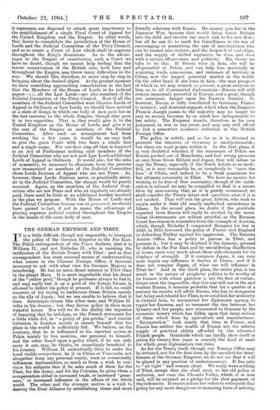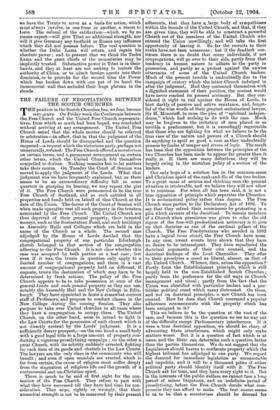I T is a little difficult, though not impossible, to interpret
the policy of the German Emperor in the Far East. The Pekin correspondent of the Times declares that it is William II., and not Nicholas II., who is resisting the ratification of the British Treaty with Tibet ; and as that correspondent has most unusual means of understanding what occurs in the Chinese Foreign Office, it becomes necessary to ask with what view his German Majesty is interfering. He has no more direct interest in Tibet than in the planet Mars. It is most improbable that his dread of the "yellow peril," though he professes always to feel it, and may really feel it as a peril of the distant future, is allowed to deflect his policy at present. If it did, we could conceive of his trying to embarrass Great Britain merely as the ally of Japan ; but we are unable to believe that it does. Sovereigns dream like other men, and William II. talks in his dreams ; but they devise policy in their most wakeful hours. Nor will we do his ability the injustice of fancying that he indulges, as the French statesmen for a little while did, in " a policy of pin-pricks," and creates irritation in London merely to assure himself that his place in the world is sufficiently felt. We believe, on the contrary, that he is influenced in his reported action at Pekin mainly by two motives, one personal to himself, and the other based upon a policy which, if he can only carry it out, may, he thinks, be exceedingly beneficial to his country. William II. undoubtedly likes to make his hand visible everywhere, be it in China or Venezuela, not altogether from any personal vanity, such as occasionally influences Ambassadors, so much as from a wish to con- vince his subjects that if he asks much of them for the Fleet, for the Army, and for his Colonies, he gives them a compensation either in increased trade, or increased "great- ness," or increased influence in the affairs of the whole world. The other and the stronger motive is a wish to destroy the Dual Alliance by establishing closer and more friendly relations with Russia. He cannot join her in the Japanese Wax, because that would bring Great Britain into the field, and involve too much risk to his new fleet ; but all he can do to mark his friendliness in the way of encouraging or permitting the sale of merchantmen who can be turned into cruisers, and the despatch of coal-ships, and the supply of skilled engineers, he does, and does with a certain effusiveness and publicity. His theory we take to be this. If Russia wins in Asia, she will be all-powerful at Pekin, and can help him materially in acquiring trade, concessions, and increases of territory in China, now the largest potential market in the world. On the other hand, if she loses in Asia—the near prospect of which is, we may remark en passant, a great surprise to him, as to all Continental diplomatists—Russia will still remain immensely powerful in Europe, and a great, though not imminent, danger upon his Eastern frontier. If, however, Russia is fully conciliated by Germany, France is isolated; and Austrian support, which when the Emperor Francis Joseph passes to the majority may no longer be easy to secure, becomes by so much less indispensable to her safety. The Emperor stands, therefore, in his own judgment, to win in any event, and may very well afford. to risk a somewhat academic irritation in the British Foreign Office.
The policy is subtle, and so far as it is directed to promote the interests of Germany is unobjectionable ; but there are weak points within it. In the first place, it is very doubtful whether, if the statesmen of Pekin see Russia pushed out of Manchuria, and feel strong pressure at once from Great Britain and Japan, they will refuse to sign the Treaty, especially if the Ninth Article is so modi- fied, as it may reasonably be, as completely to " save the face " of China, and, indeed, to be a fresh guarantee for her ultimate suzerainty in Tibet. We have no motive for wishing to be free of that suzerainty, though if the ratifi- cation is refused we may be compelled to deal it a severe blow by announcing that, as it is purely ceremonial, we shall consider the Treaty intact and operative, even if it is not ratified. That will suit the great Abbots, who wish to regain under it their old nearly unchecked ascendency in Lhasa. In the second place, we doubt if the gratitude expected from Russia will really be excited by the move. Great Governments are seldom grateful, as the Russian Court has reason to remember from the example of Austria, which, though Nicholas I. conquered Hungary for her in 1849, in 1855 favoured the policy of France and England in defending Turkey against his aggression. The Russian Asiatic Office has a policy to pursue in Tibet, and pursues it ; but it may be doubted if the dynasty, pressed. by defeat in the Far East and by smouldering disaffection at home, cares very much about these side-channels for its displays of strength. If it conquers Japan, it can very soon regain any influence it desires at Lhasa ; and if it does not conquer Japan, of what use will influence in Tibet be ? And in the third place, the entire plan is too much in the nature of prophetic politics to be worthy of its framer, with whom patience is not the first of virtues. Grant even the impossible, that this war will not in the end weaken Russia, it remains probable that for a quarter of a century its results will affect Russia, who has to reorganise her Army and rebuild her Fleet, to re-establish her authority in Central Asia, to reconstruct her diplomatic agency, to repair her finances, and to recement the ties between her dynasty and her people, now attenuated to thinness by the economic misery which has fallen upon that large section of them which lives by agriculture and manufactures. " Recuperation " took nearly that time in France, and Russia has neither the wealth of France nor the infinite supply of practical ability afforded by the educated French people. Gratitude which can hardly show itself in action for twenty-five years is scarcely the kind of asset for which great diplomatists run risks.
As for the Treaty itself, though our Foreign Office may be irritated, not for the first time, by the uncalled-for inter- ference of the German Emperor, we do not see that it will be placed in any position of embarrassment. It has only to " sit tight" and remain silent. We really want nothing of Tibet, except that she shall recur to her old policy of seclusion, not even the Chumbi Valley, which, it is now said, will be retained as a pledge for the slow payment of the indemnity. If events induce her rulers to relinquish that policy for any more dangerous or menacing form of activity, we have the Treaty to serve as a basis for action, which must always involve, in one form or another, a resort to force. The refusal of the ratification—which we by no means expect—will give Tibet no additional strength, nor will it give Germany any foothold or Russia any influence which they did not possess before. The real question is whether the Dalai Lama will return, and regain his absolute power ; and to prevent that we think the Teshu Lama and the great chiefs of the monasteries may be implicitly trusted. Substantive power in Tibet is in their hands, and they at least are not seeking to restore the authority of China, or to admit foreign agents into their dominion, or to provoke for the second time the Power which has broken down with one pat of its hand the immemorial wall that secluded their huge plateau in the clouds.











































 Previous page
Previous page